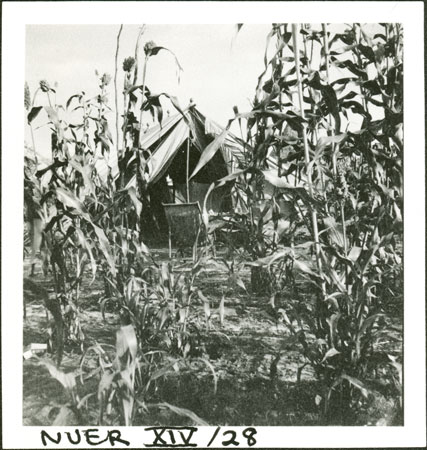Evans-Pritchard's tent in Nuerland

58 x 55 mm | Print gelatin silver
Date of Print:
Unknown
Previous PRM Number:
EP.N.XIV.28
Previous Other Number:
83 3
Accession Number:
1998.355.664.2
Description:
Looking through a section of millet garden towards Evans-Pritchard's tent, erected in the village of Mancom, the home of his Gaajok servant Tiop, and where he spent 4 weeks in 1935.
In front of the tent can be seen a table and deck-chair, and within can just be made out a bed with suspended mosquito net.
Evans-Pritchard described being 'almost eaten alive by mosquitos' whilst encamped here, when hundreds of the insects sought shade within his tent each morning.
'One gets little rest', he wrote, 'and fever is sooner or later inevitable.'
Photographer:
Edward Evan Evans-Pritchard
Date of Photo:
1935
Region:
[Southern Sudan] Upper Nile Nyanding River (mouth) Mancom
PRM Source:
Edward Evan Evans-Pritchard
Acquired:
Donated 1966
Other Owners:
E. E. Evans-Pritchard Collection
Class:
Shelter , Agriculture and Horticulture
Keyword:
Tent , Garden , Crop Millet
Documentation:
Original catalogue lists in Manuscript Collections. Additional material in related documents files. [CM 27/9/2005]
Primary Documentation:
Accession Book Entry [p.
98] 1966.27 [1 - 24] G[ift] PROFESSOR E.
E.
EVANS-PRITCHARD; INST.
OF SOCIAL ANTHROPOLOGY, 51 BANBURY RD.
OXFORD 1966.27.1-16 S.
SUDAN.
NUER TRIBE.
Sixteen negative albums containing negatives
and
prints of photographs taken by donor during field-work.
All listed in albums.
Added Accession Book Entry - [p.
98 in right hand column, in pencil] Catalogue room.
Manual Catalogues [index taken from album book XIV, ms ink] - 28. my tent
Note on print reverse ms pencil - "83 3" & print front border ms ink - "NUER XIV/28"
Manual Catalogues [index taken from album book XIV, ms ink] - 28. my tent
Note on print reverse ms pencil - "83 3" & print front border ms ink - "NUER XIV/28"
Other Information:
In E.
E.
Evans-Pritchard's article Economic Life of the Nuer: Cattle (Part 2), Sudan Notes and Records XXI, No.1, 1938, p.59, he notes that 'During my residence at Mancom on the Sobat in July, 1935, I was almost eaten alive by mosquitos.
My cotton mosquito house afforded me some protection at night but insects soon made holes in it and the mosquitos entered.
Moreover, they swarmed outside like a beleaguering army and on my leaving or entering the house battalions invaded it.
The worst time was between six and nine o'clock in the morning when hundreds of mosquitos collected in my tent to escape the sun so that it was impossible to sit in it without being repeatedly bitten.
One gets little rest, and fever is sooner or later inevitable.' [Chris Morton 27/8/2004]
Recorder:
Christopher Morton [27/8/2004] [Southern Sudan Project]

